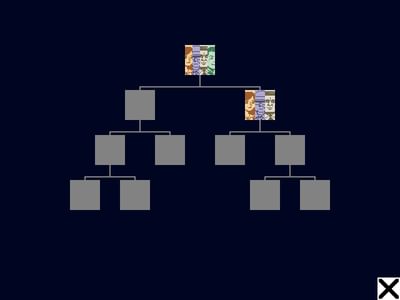Based on Clean Architecture, by Robert Martin,
with code examples and detailed explanations.
Je vous recommande sincèrement ce petit jeu (1 page à imprimer) gratuit qui,
malgré un léger manque de rejouabilité, est très fun, bien équilibré, graphiquement joli
et somme toute l'occasion de passer un bon moment, seul ou à 2 en coop !
FROM: https://pnpfrance.wordpress.com/2016/06/22/oh-my-lair/
Je plussoie cette critique positive de cette BD dont vous êtes le héro !
Tix.tax is a version of Ultimate tic-tac-toe that you can play with friends, or offline against a bot. I took a lot of inspiration from bejofo.net and The Ofek Foundation while making the game, but tried to stand out by adding many new features and using the latest technology.
The Reward, Tales of Alethrion is a web-series streamed on Youtube and created from the graduation film "The Reward". It has since then been produced thanks to 2 successful crowdfunding campaigns and danish public funds.

a game about decisions. You will choose who lives and who dies, and your choices will change the events of the game completely.
a 1-min minigame with a hidden message...
P.S: you can add your own personal message
Voici une petite dépêche que j'ai écrite sur le site LinuxFr : https://linuxfr.org/news/generateurs-de-puzzles-libres
Des serveurs d’Amazon jusqu’aux machines rouges installées directement chez les fournisseurs d’accès à internet, la firme a créé au fil des années un système complexe, mais d’une efficacité redoutable, le tout à un prix très raisonnable qui lui donne un avantage concurrentiel évident.
Auditing software is hard! The most-heavily scrutinized smart contract in history had a small bug that nobody noticed — that is, until someone did notice it, and used it to steal fifty million dollars.
you’re trusting in the software (and your ability to defend yourself in a software-driven world), instead of trusting other people.
Another example: the purported advantages for a voting system in a weakly-governed country. [...] is your Afghan villager going to download the blockchain from a broadcast node and decrypt the Merkle root from his Linux command line to independently verify that his vote has been counted? Or will he rely on the mobile app of a trusted third party — like the nonprofit or open-source consortium administering the election or providing the software?
Blockchain systems are supposed to be more trustworthy, but in fact they are the least trustworthy systems in the world. Today, in less than a decade, three successive top bitcoin exchanges have been hacked
you’ll rely on one of four things [...] : either the author of the smart contract is someone you know of and trust, the seller of the e-book has a reputation to uphold, you or friends of yours have bought e-books from this seller in the past successfully, or you’re just willing to hope that this person will deal fairly. In each case, even if the transaction is effectuated via a smart contract, in practice you’re relying on trust of a counterparty or middleman
Projects based on the elimination of trust have failed to capture customers’ interest because trust is actually so damn valuable.
Instead of directing resources to the elimination of trust, we should direct our resources to the creation of trust—whether we use a long series of sequentially hashed files as our storage medium or not.
A week ago, I didn’t even know .dev was a real gTLD. Historically it’s just been the realm of programmers who need a fake domain for testing. The domain never really existed, we just told our computers to pretend it does.
But the .dev gTLD does exist. And guess who owns it?
That’s right.
It’s Google.
Suddenly, it all makes sense. Who can decide to make an entire TLD secure?
Au programme de cette présentation de Marie Guillaumet, d'Access42 :
- Caractères – microtypo
- Composition – macrotypo
- Effets décoratifs
- Écriture inclusive
I used to think Open Source was amazing. I've since come to realize just how awful it is.
My code is free — my time is not.
We’ll be learning about Locks , RLocks , Semaphores , Events , Conditions and Barriers
flask
httpie
requests
simplejson
botocore
scrapy
docker-compose
ansible
What are those diagrams ?
They show dependencies between the internal modules of various well-known Python libraries.
They goal is to provide a global overview of a Python project architecture, as a map of modules & packages, the top-level code abstractions.
Note that all …
Découvert grâce au blog "Du papier et des jeux", j'ai testé ces derniers jours le jeu print & play pour 2 joueurs The Salem Conspiracy.
Et je vous le recommande vivement si vous cherchez un petit jeu de duel tactique court (~15min) pour 2 joueurs, ne requiérant que très peu de …
There are a lot of different types of A.I. and they can be grouped by some basic properties: White Box, Black Box, Grey Box
With my own systems, I call each of these kinds of rules a flag. One flag isn't bad. Two flags should be monitored. Three flags need a manual evaluation. And any more flags merit an automated response. (E.g., (1) A new account that (2) is associated with a known bot naming pattern, and (3) is posting about a current undesirable topic? Manually evaluate it. If it also (4) comes from a known hostile cloud provider, then just block it.)
Rules like these don't require deep neural network (DNN) technologies; these are heuristics for an expert system. They can be implemented, tested, and deployed very quickly. Moreover, expert systems like these are likely to have fewer errors. I think Zuckerberg's reliance on DNN technologies is a big mistake, and not something that will be accurate enough in the next 5-10 years.
Aux USA l’espionnage des citoyens vient de prendre un level (si, si, c'est possible) avec la loi CLOUD